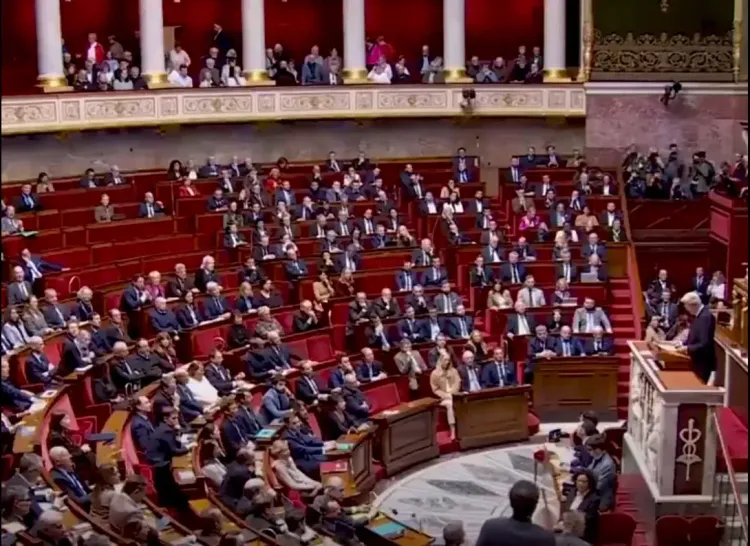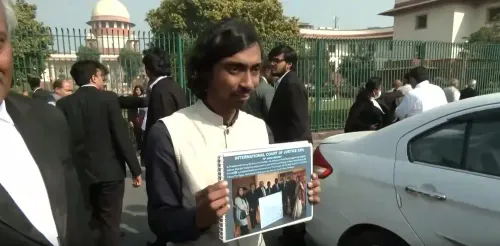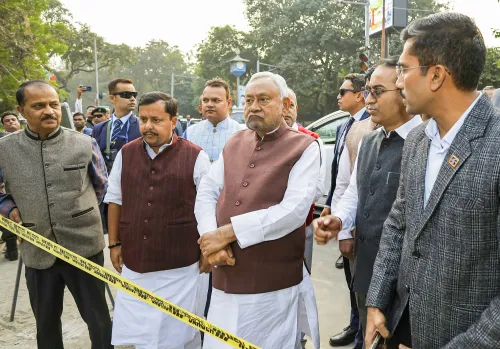Will French Prime Minister Barnier Endure His Second No-Confidence Vote Tomorrow?

New Delhi, Dec 3 (NationPress) Surrounded by a combative left coalition that encompasses various ideologies and the far-right, French Prime Minister Michel Barnier is facing significant challenges. With a struggling economy and insufficient legislative backing to even pass the Budget, Barnier might, by Wednesday or later this month, break the record for the shortest tenure in the role.
On Monday, he managed to pass the social security budget utilizing Article 49.3 of the Constitution, allowing passage without a vote, and indicated a similar strategy for the budget later this month. This has angered the far-right National Rally, which has signaled it will oppose him unless a “last-minute miracle” occurs.
A no-confidence motion could arise as early as Wednesday, and if the National Rally follows through on its threats, Barnier may be dismissed after just about 90 days in office.
This would surpass the record of the Fifth French Republic's briefest-serving Premier, Bernard Cazeneuve, who held the position for 160 days in 2016-17, and is significantly shorter than his predecessor Gabriel Attal's 240 days.
Jordan Bardella, the youthful leader of the National Rally, whose ambitions for the Prime Minister's office were thwarted by a tactical alliance between President Emmanuel Macron's Ensemble Alliance and the left-leaning New Popular Front during the parliamentary elections, has labeled the proposed budget as “a punishment” that will diminish the wealth of the French populace, declaring the party's intention to vote against the government “unless a last-minute miracle occurs.”
The New Popular Front, the dominant faction in the 577-member National Assembly with 192 members, has little affection for Barnier's government, particularly since Macron excluded it from power as the largest party. It has also voiced its disapproval of multiple elements in the Budget, which aims to save the government €60 billion to manage the fiscal deficit.
Jean-Luc Mélenchon from the Radical Left party, France Unbowed, has already forecast the collapse of Barnier's government before Christmas, with December 21 being the final deadline for the Budget's approval.
In contrast to the Front and the National Rally's 124 members (or 140 if Eric Ciotti's faction of The Republicans is included), Barnier's right-wing The Republicans and Macron's centrists' collective 210 votes are insufficient.
To placate the National Rally, Barnier has retracted the suggested increase in electricity taxes—a “red line” for the party—and eliminated the proposed 5 percent cut in medication reimbursements. However, their demand for inflation-indexed pension payments poses a challenge due to the ongoing deficit.
Moreover, Barnier's troubles extend beyond the opposition.
He has raised alarms within Macron's Ensemble by signaling that he does not fully endorse “Macronomics”, the economic policies implemented since 2017. At least two of his proposals regarding corporate and household taxes, along with exemptions from employers' social security contributions, differ significantly from the established orthodoxy.
The Macron bloc argues that these changes will hinder growth and jeopardize jobs. Conversely, some lawmakers from Barnier's party criticize him for not sufficiently distancing himself from Macronism.
Aside from the Budget predicament, Barnier is also grappling with a palpable lack of authority within the ruling coalition, as tensions rise between his party's leader in the Assembly, Laurent Wauquiez, and the leader of Macron's Renaissance group and former Prime Minister Attal.
If Barnier's government collapses on Wednesday or later in December due to “no last-minute miracle,” President Macron may have the option to reappoint him as Prime Minister or select a new candidate, form a technocratic government, call for a referendum, or resign, given that a new election is off the table until mid-2025. Nonetheless, the President, currently in the middle of his second and final term, has consistently dismissed the idea of resigning before his term ends in 2027.
Barnier might still persist or become the latest scapegoat for Macron, but it is the latter who will bear the burden of his legacy due to a series of reckless political choices made this year. This turmoil began when he called a snap parliamentary election earlier this year following a defeat in the European Parliament elections.
Through his decisions—forming a tacit alliance with the NPF to thwart the far-right's anticipated success, followed by a rupture with the left—Macron has alienated both political extremes, a questionable strategy during a time when the centrist space is contracting.
While a new Prime Minister and government may emerge, the extreme polarization resulting from Macron's political maneuvers is unlikely to dissipate anytime soon.









